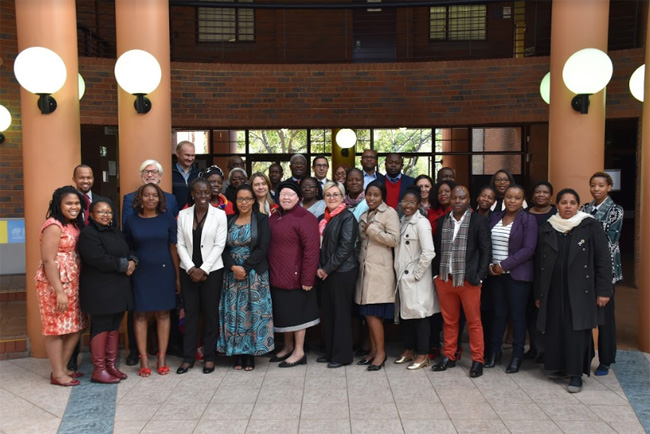Experts from across Southern Africa attended a meeting at the University Pretoria on 30 May 2018 to explore ways in which more attention can be drawn to the plight of older women in the region, and in Africa. They called for African states to follow the lead of Lesotho, which is on the verge of formalising its ratification of the African Union’s Protocol on the Rights of Older Persons in Africa. .
The following picture emerged from the experts’ contributions: Older women are uniquely vulnerable to the compounded impact of ageism, disempowerment and sexism. They face legal, social and structurally barriers that affect their access to health, social protection, protection from violence. They are more likely than their male counterparts to be poor, without pension or health care, socially ostracised and victimised in old age. These issues are exacerbated by the impact of HIV and AIDS on their lives and the increased burden of care of orphaned, vulnerable children and sick family members, and the continued stigmatization of older persons that results in older women being accused of witchcraft. Notwithstanding these critical issues, in many countries in Africa the protection and promotion of the rights of older persons and older women specifically remain inadequate.
The Centre for Human Rights at the University of Pretoria hosted the meeting, which brought together various stakeholders from Southern Africa to deliberate and strategise on ways to enhance the protection of the rights of older persons. The meeting was attended by representatives from the African Union, the Pan African Parliament, the South African Human Rights Commission and the Commission for Gender Equality, government representatives, embassies, civil society and academics from Southern Africa.
The Centre for Human Rights has embarked on a yearlong campaign to highlight the situation of older women in Africa. Part of this campaign is calling on African governments to ratify the Protocol to the African Charter on Human and Peoples Rights on the Rights of Older Persons. This Protocol was adopted in 2016 and requires at least 15 States to ratify it before it can come into force. Lesotho is set to become the first country to ratify this Protocol, after an announcement in this meeting that it has prepared the instrument of ratification and is in the process of depositing it with the African Union Commission in Addis Ababa. The Centre for Human Rights welcomes this momentous step by Lesotho and joins the call by participants at the meeting for other Southern African States to follow suit and ratify the Protocol. Of particular mention are South Africa and Mauritius, which already have strong social support systems for older persons in place, and Zambia, which is the only country in Southern Africa that has signed the Protocol.
The Pan African Parliament reiterated the call made through its Recommendation on the Rights of Older Person in Africa (17 May 2018) that Member States ratify the Protocol and protect older persons from abuse, neglect and harmful practices. Other important recommendations that came out of the meeting includethe need for greater awareness and information sharing on the importance of the Protocol on Older Persons, amplifying the voices of older persons through movement building and improved collaboration and synergies between civil society and government departments in pushing for the ratification of the Protocol on the Rights of Older Persons.
In addition, the meeting highlighted the important role of Chapter 9 institutions in South Africa, in monitoring the protection of the rights of older person. Participant also noted the important role of families and communities in the promotion and protection of the rights of older persons and in particular older women, calling for the development of social policies that go beyond provision of social grants but which take a holistic approach to ageing that does not only intervene at old age but use a life cycle approach that views ageing as a natural process whose impact is compounded by the experiences throughout one’s life. A life cycle approach is essential, especially with regards to dealing with the impact of gender equality and violence and discrimination whose effects are visible in ageing.
Links
- #AgeWithRights: Centre for Human Rights Campaign on the rights of older persons
- The Protocol on the Rights of Older persons
- Lesotho’s Instrument of Ratification
- The Pan African Parliament Recommendation on Older Persons in Africa
For further information, please contact:
Ms Patience Mungwari Mpani
Programme Manager, Women’s Rights Unit
Centre for Human Rights
Faculty of Law, University of Pretoria
Tel: +27 (0) 12 420 4525
patience.mpani@up.ac.za
www.chr.up.ac.za


